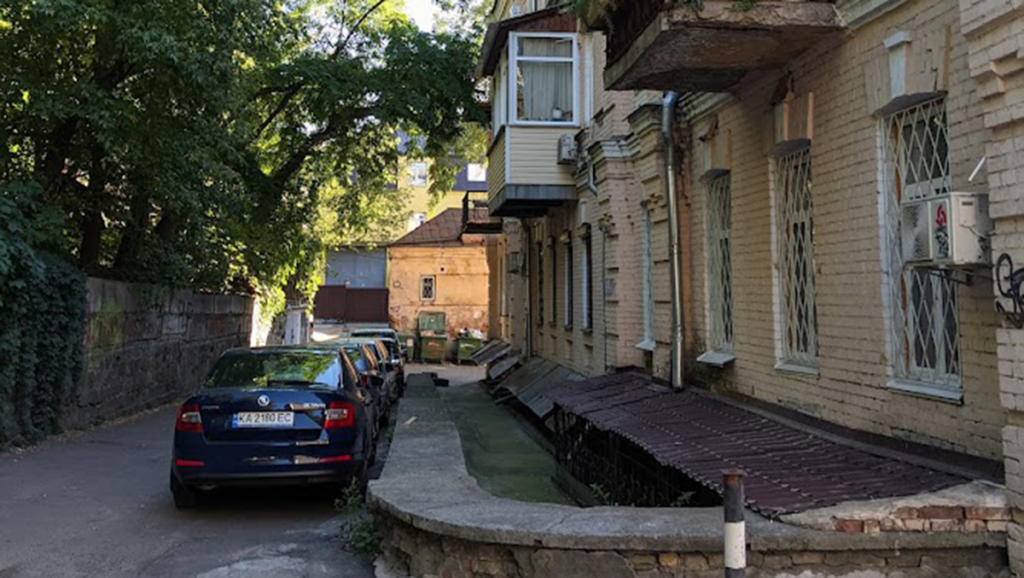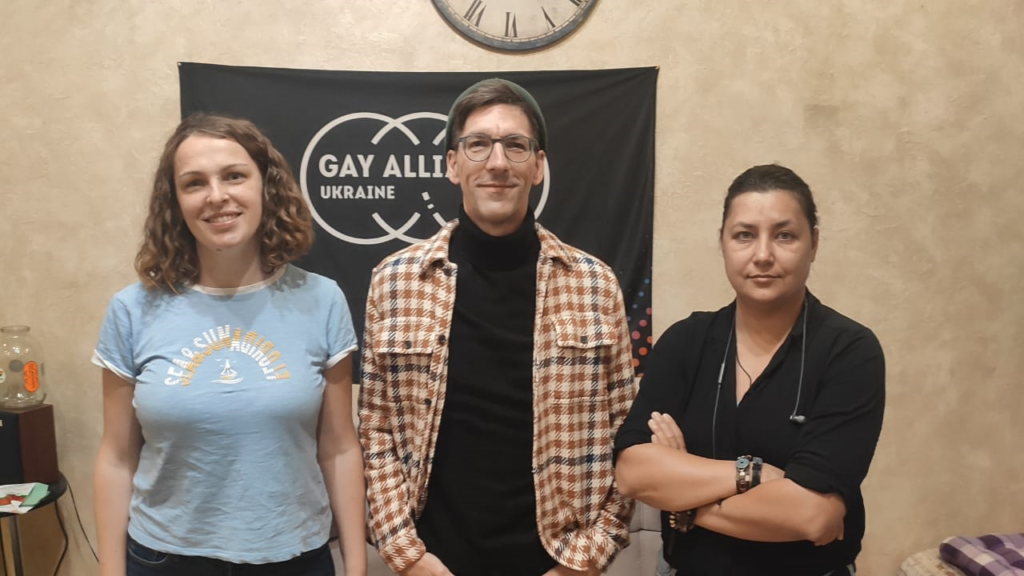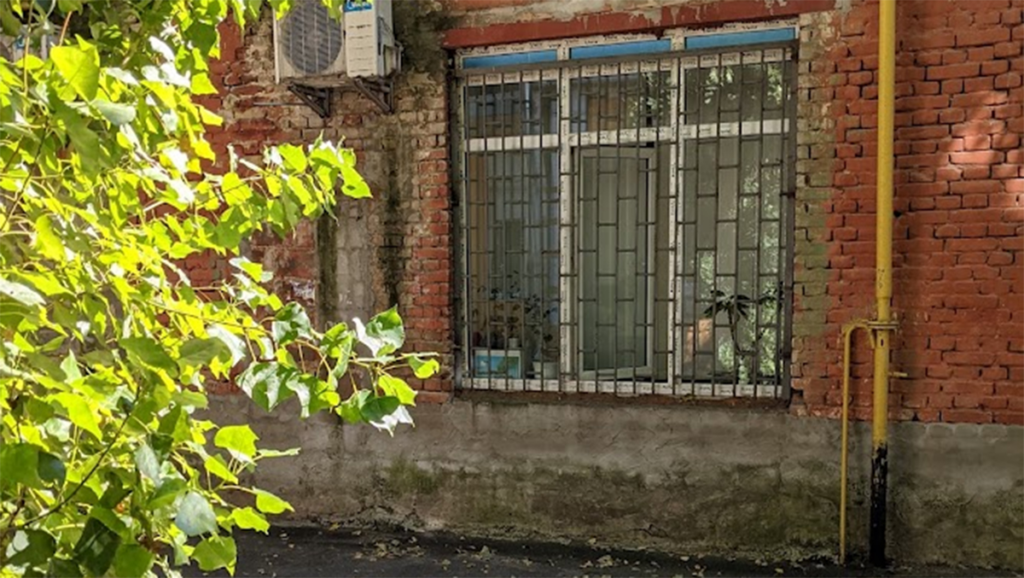PrideBlog – Rave meets Pride
by Conrad Breyer
Two years we have not been to Ukraine, two years we have sorely missed our friends in Kyiv. Sure, we did some really good online projects, webinars, sports challenges, a virtual exhibition, even choir rehearsals, but being here, heading to the streets for Human Rights together with our people, is of course something else.

Our delegation is quite small with two people this year – but it also gives us the freedom to spontaneously participate in events and meet activists whenever it suits us, instead of following a tight delegation’s program.
We are really happy to be back in Kyiv, in this city where it all started nine years ago with a failed Pride March. At that time, there was a desire to create a new movement together with our twin city.
A country wakes up
What has happened in Ukraine in the past two years in terms of LGBTIQ* issues? Nothing, actually. Pandemic – otherwise it was pretty quiet. The government and parliament had their hands full trying to get a handle on the Corona crisis. Practically speaking, the pandemic also served as an excuse for them when they were asked to show commitment.

Lately, however, things have been moving again. In the summer, for example, the young NGO UkrainePride, co-founded by activist Sofiia Lapina (above right), organized a rave for LGBTIQ* in front of the official residence of Ukraine’s President Volodymyr Zelensky that received worldwide attention. No classic protest with banners, no activists shouting out political demands – just music for six long hours.
The organizers had previously made demands in a press release and in conversation with the media, which reported on the event. It was mostly about violence against LGBTIQ*. But on site they showed themselves as a queer community that wants to express itself freely.
Queer Capital of Europe
The message got through, as Sofiia tells me. I meet her around noon at the café “What you want” in the trendy Podil district, where many LGBTIQ*-friendly bars have now installed shops. She talks about the many rave-loving French, Germans and Americans who have moved to Kyiv to carry out their projects here – in this Berlin of the East. Anything goes! As KyivPost writes: “Kyiv’s electro scene has really exploded in recent years, with international DJs performing every weekend and promoters coming to Ukraine to organize their own events.”

And Sofiia – despite spending years advocating for Human Rights at KyivPride, among other events – was surprised herself when she recently discovered the club scene for herself and realized how free this world is – home to many queers who don’t want to advocate for their cause on the streets. Because they’re afraid. Because it’s not their cup of tea. Or because they don’t feel represented by the many LGBTIQ* organizations in the country.
Politics does nothing anyway
For Sofiia, however, it was clear that there was huge potential here to find allies for LGBTIQ* and to lobby for a good cause. The rave in the city was a success: Politicians have taken positive note of the event, as she knows from insiders. Sofiia thinks it generally makes more sense to work with society, whose acceptance is growing, instead of simply talking year after year to politicians who do nothing for LGBTIQ* anyway.

In any case, the action has caused discussions – also within the community. Next up are projects with religious institutions and sports associations, among others. For this, they are also looking for established LGBTIQ* organizations as partners. Perhaps we can also invite the makers of RavePride to Munich. This is certainly more appealing to young people.
In the afternoon, I have an appointment with Anna Leonova (right above) and Olena Hanich from Gay Alliance Ukraine in their new office. They proudly show me around the large, comfortable rooms. We have cooperated with the organization from the very beginning. The NGO organized the first Prides in Kyiv starting in 2012; today, a professional NGO takes over. In return, they organize the Pride in Odesa. This year it took place again, but due to the pandemic there were only a few hundred people.
Enemy of the people
The opponents also sent a “delegation”, but due to the resignation of Interior Minister Arsen Avakov, they are currently rather weak, as could be seen a few days ago at Pride in Kharkiv. The politician has apparently always kept his protective hand over the radical right-wing organizations in Ukraine. Currently, the leaders of “Tradition and Order,” for example, are under house arrest. They had distributed a lot of propaganda material in the city during and in the run-up to OdesaPride: One flyer showed Anna’s face among other activists, with the words “Know the face of your enemy” written underneath.

The Gay Alliance Ukraine actually focuses on community building. A few years ago, the organization opened seven queer homes in the country; four of them still exist today. They are communication and cultural centers with counseling, self-help and recreational offerings like those offered in Munich by the lesbian counseling center LeTRa, the gay center Sub or the LGBTIQ* youth organization Diversity. The centers offer LGBTIQ* a home, strengthen their identity and provide a safe space for the mainly voluntary activities. Hence the new spaces – in Kyiv, the Queer Home is integrated into the Gay Alliance Ukraine office.
A law against hate crimes?
Because they are so important, Munich Kyiv Queer and Munich’s community have supported the facilities from the beginning, primarily with donations. Two of the four centers are financed by the NGO COC Netherlands, but the others still need help because, with Corona, no donors can be found at the moment. At the same time, the offer is super sustainable. A new center or facility is planned in Chernivtsi, where the community is already strongly mobilized.
A surprise at the end: In autumn, the parliament will discuss a bill on hate crimes, which is – along the Ukrainian government’s action plan against homo- and trans* phobia – another step to fight discrimination of LGBTIQ*-people. “We can only guess who’s decision it was to finally offer the draft law to the Parliament and wyh right now”, says Anna. In any case, it would be a revolution; not even in Germany there is such a law. It would put an end to discrimination and violence against LGBTIQ* in the country, Anna is convinced. Perpetrators would be prosecuted and severely punished. Because violent crimes of hatred, for example against LGBTIQ*, would then weigh more heavily than other assaults.
That’s why we definitely are willing to march at Pride on Sunday!
Back to overview